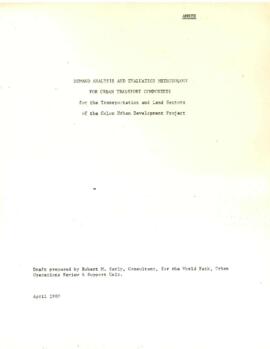Identity area
Reference code
Title
Date(s)
- 1972 - 2015 (Creation)
Level of description
Fonds
Extent and medium
166.20 linear feet of textual records; 4.50 linear feet of videocassettes; 1.66 linear feet of audiocassettes
Context area
Name of creator
Biographical history
Sector departments were created as part of a World Bank-wide reorganization in 1972. The sector departments were responsible for improving and maintaining the quality of Bank lending and related operations through sector policy and guideline development; support and review of operations; recruitment assistance; staff development and training; and liaison with external organizations. Sector departments were generally not responsible for leading project lending operations and member country relations. The Bank's projects and member country relations were instead the responsibility of regional vice presidencies (RVPs). See the related units of description note for more information.
The Bank's sector work began in the Economic Department (created April 19, 1948) and the Technical Operations Department (TOD) (September 1952 to January 18, 1965). Departments were structured geographically; there were no specific units assigned to different sectors. These departments had similar responsibilities for operational and sector work, providing expertise and assistance for projects and studies that mainly addressed basic utilities and infrastructure. Urban issues were initially limited to water supply and sanitation.
1968 - 1972
Urban development was first articulated in the organizational structure starting in 1968 when President McNamara created an Economics of Urbanization Division in the Economic Department led by Chief Richard Westebbe. On November 1, 1968, a reorganization of Bank departments led to the creation of the Special Projects Department (SPP) that began operations in October of 1969. SPP was responsible for inter-sectoral, multi-purpose, and very large projects. The Urbanization and Regional Projects Department (SPPRB) was one of the three departmental divisions.
The three departments of the Special Projects Department were responsible for:
-
identifying, appraising and supervising projects;
-
carrying out research and monitoring developments in its sectors;
-
providing advice to the area departments; and
-
cooperating with other international agencies, such as the United Nations Development Programme (UNDP), on programs of common interest.
An urbanization sector policy paper was requested in 1971 and completed in 1972 under the title Sectoral working paper: Urbanization. The paper outlined the problems within urban areas and examined potential strategies to reduce urban pressures and methods for improving resource efficiency and urban productivity. It also addressed the role of the Bank in urban development.
The Bank's first project in the urban sector and the first in the Western Africa region was the Senegal Sites and Services Project P002280, approved in June 1972. Most of the Bank's urban lending that followed in the 1970s was centered on similar sites and services projects. These projects provided plots of land, basicinfrastructure, and social services to low-income families, enabling them to build their homes incrementally. Other early projects focused on upgrading squatter settlements.
1972 - 1986
SPP was terminated as part of a Bank-wide reorganization in October, 1972. In order to more effectively fuse country knowledge and sector skills, sectors with a sufficient number of experts and an established lending program were largely decentralized; while maintaining a centralized core staff of department advisors, the majority of staff were dispersed to regional project departments in newly established regional vice presidencies. The remaining centralized staff made up the sector operating departments and performed advisory services for the regions. Because of its small number of staff, the urban sector of the former Special Projects Department remained centralized within the newly formed Central Projects Staff Vice Presidency (CPSVP), and was given the name Urban Projects Department (UBP). As a centralized operating projects department (COPD), the department provided a full operational package of technical services to the regions and was responsible not only for policy formulation and quality control, but also for the planning, direction and supervision of project and economic sector work. On the date of its establishment, the Urban Projects Department comprised two departments: Operations Division I (UBPD1) and Operations Division II (UBPD2). The previous director of SPP, Robert Sadove, continued to lead the new department.
On October 1, 1973, the Urban Projects Department was merged with the Transportation Department (TRP) to form the Transportation and Urban Projects Department (TRU). The department continued to report to the CPSVP. However, transportation projects continued to function as a sector department, performing only advisory services for the regions at their request and also formulating policies and quality control. The department's urban project functionality continued to act as a centralized operating projects department. The department maintained two Urban-related divisions - Urban Projects I (TRUD1) and Urban Projects II (TRUD2) - along with a Transport Research Division (TRURS). On February 1, 1976, a third urban-related operational division, Urban Projects III (TRUD3), was established in anticipation of an expanded role for the department.
On June 1, 1976, staff working on urban projects were separated from those working on transportation projects and re-established as an independent Urban Projects Department (URB). It remained a centralized operating projects department and, as such, it continued to be responsible not only for policy formulation and quality control, but also for the planning, direction and supervision of project and economic sector work. This organizational restructuring was undertaken as part of the implementation of the Bank's new Urban Poverty Program. The program, announced in President McNamara's 1975 speech to the Board of Governors, was an interdepartmental Task Group chaired by Urban Projects Department director Mr. E.V.K. Jaycox and was designed to develop an Urban Poverty Action Program. Its oversight led to a significant increase in Department workload, as it became responsible for coordinating input of all organizational units involved in the Program as well as designing new policies, methods and projects to alleviate urban poverty. The department's Housing Sector Policy paperissued in 1975 examined the economics of housing and provided recommendations for future lending to ensure efficient and equitable development.
At the date of its re-establishment in 1976, the Urban Projects Department was composed of the following divisions: Urban Division I (URBD1), Urban Division II (URBD2), Urban Division III (URBD3), the Sites and Services Monitoring Unit (URBMO), and the Operations Review and Support Unit (URBOR). The latter was responsible for supervising the Urban Poverty Program.By October of 1978, it was determined that the department's policies, methods and standards were sufficiently mature to permit regionalization. Consequently, a significant amount of organizational restructuring took place during the following year in preparation for regionalization. On January 1, 1979, realignment of the Department's three operational divisions took place. Division I was assigned responsibility for Latin America, while Division II was assigned responsibility for Europe, Middle East, and North America as well as South Asia and Division III was given responsibility for East Asia and the Pacific. On or around this time a fourth operational division, Urban Division IV (URBD4), was created and given responsibility for Eastern and Western Africa. Also, on July 1, 1979, a new Tourism Advisory Service (URBTO) was established in the Urban Department, taking on some of the functions of the terminated Tourism Projects Department (TOU).
Regionalization of Urban Projects Department divisions began in July of 1979 when Division I of the Urban Projects Department was moved to the Latin America and Caribbean Region (LAC). In July of 1980, Division III was transferred to the East Asia and Pacific Region (AEN). At the same time, the Europe, Middle East, and North America responsibilities were separated from South Asia within Division II in preparation for the divisions' transfer to regional departments. Transfer of these two sections of Division II occurred on January 1, 1981. In March of the same year Division IV was split to form independent divisions for Eastern Africa and Western Africa in preparation for their regionalization. Transfer to regional departments occurred in August 1, 1981, for Eastern Africa Region (EAN) and October 1, 1981, for Western Africa Region (EAN). This concluded the regionalization of the Urban Projects Department.
In mid-1981, the Tourism Advisory Service (URBTO) was terminated. Some of its functions were transferred to the Tourism Advisor in the Front Office of the Urban Department (URBDR). In February of 1982, after the transformation of the Central Projects Staff (CPS) into the Operations Policy Staff (OPS), the department began to report to the vice president, Operations Policy (OPSVP).
On July 1, 1983, the Urban Projects Department was merged with the water supply functions of the former Transportation and Water Department (TWD) to form the new Water Supply and Urban Development Department (WUD). The department continued to report to OPSVP. The department operated as a sector department with responsibility for operations and development policy formulation, research, operational support and quality control for project and sector work. Anthony Churchill, who had taken over from E.V.K. Jaycox as the Urban Projects Department (URB) director on October 15, 1979, was named director of WUD; Ping-Cheung Loh would take over on July 1, 1986.
The structure of the Department comprised an Operations Support and Research Division (WUDSR), which in turn comprised an Operations Research Unit (WUDOR) and the UNDP-affiliated Water Supply and Sanitation Unit (WUDWS) and Applied Research and Technology Unit (WUDAT). On October 1, 1985, the Department was reorganized to bring the policy advisors together under the Senior Advisor heading of the Operations Policy and Research Staff (WUDOS), and the rest of the staff under the Chief of the renamed Operations Research and Policy Division (WUDOD). During this period, the 1983 sector review, Learning by doing: World Bank lending for urban development, 1972-82 studied the effectiveness of the Bank's experience and examined future projects and issues.
1987 - 1996
On July 1, 1987, a Bank-wide reorganization resulted in the termination of almost all organizational units. A new department, the Infrastructure and Urban Development Department (INU), incorporated the previous Water Supply and Urban Development Department and Transportation Department, and was placed in the Sector Policy and Research Vice-Presidency (PRE, then, after January 1, 1990, the PRS). The PRE had no responsibility for managing operational activities but, rather, focused on operational support, the formulation of Bank-wide sector policies and overseeing the ex post evaluation of Bank-wide sector work and lending. The units within the PRE concentrated on policy creation and analysis, support for operations and sectoral research for emerging priority areas of the Bank.
At the time of its establishment, the Infrastructure and Urban Development Department (INU) comprised three divisions: Transport Division (INUTD), Water and Urban Development Division (INUWD), and Infrastructure Strategy, Management, and Assessment Division (INUIS). INU was responsible for:
-
developing, in consultation with the Regions, priorities for research and policy on key issues in urban development;
-
conducting policy analyses, research, external liaison, operational support, and related quality enhancement activities on various economic, environmental, institutional and management issues;
-
advising on urban development issues in the design of country strategies, and in adjustment and sector operations;
-
providing operational support to strengthen links among research, policy and projects;
-
reviewing annual performance of Bank operations in the urban sector; and
-
disseminating research results and policy studies for the sector and organizing and conducting appropriate training seminars on emerging issues in the sector.
The Bank announced a shift in urban policies and strategies with the publication of the April 1991 Urban policy paper. The paper discussed the expansion of megacities and the need to maintain the Bank's focus on poverty reduction, while emphasizing urban productivity to increase economic growth and addressing pollution.
On December 1, 1991, President Lewis Preston's first reorganization abolished all Senior Vice-Presidencies. The new Sector and Operations Policy Vice Presidency (OSP) was created and adopted functions previously supervised by Senior Vice Presidents, including the Infrastructure and Urban Development Department. On January 1, 1993, as part of a larger initiative to align the Bank's organization with the priority areas of its poverty reduction effort, the Sector and Operations Policy Vice Presidency was terminated. It was replaced by three new thematic vice presidencies: Human Resources Development and Operations Policy (HRO), Finance and Private Sector Development (FPD), and Environmentally Sustainable Development (ESD). All research activities were removed from the departments in the central vice presidencies, including INF, and were consolidated under the chief economist and vice president for Development Economics (DECVP). The Policy Research Department (PRD) under DECVP became the principal research arm of the Bank; IEN was no longer responsible for urban sector research.
On January 1, 1993, the urban development function was placed in the newly created Transportation, Water and Urban Development Department (TWU). The Department's first director was Louis Y. Pouliquen. The Department was organized within the Environmentally Sustainable Development Vice Presidency alongside three other sector or thematic departments: the Agriculture and Natural Resources Department (AGR), Environment Department (ENV), and the Consultative Group for International Agricultural Research (CGIAR) Secretariat. At the time of its creation, the Transportation, Water and Urban Development Department had the following divisions: the Transportation Division (TWUTD), the Urban Development Division (TWURDS), the Water and Sanitation Division (TWUWS), and the UNDP/World Bank Water and Sanitation Program (TWUWU).
Each Sector Department was responsible for the following:
-
preparing policies, guidelines, standards, handbooks and analytical tools relevant to the sector;
-
identifying, codifying and disseminating best practices and lessons of experience, and evaluating weaknesses;
-
providing advice to the Regions as needed;
-
monitoring and tracking work in the sectors assigned in order to identify generic issues and identifying, evaluating and influencing trends and patterns;
-
performing surveys of experience and practice within the Bank and elsewhere, and develop innovative approaches;
-
participating in Bank-wide efforts to assess skill requirements, and to upgrade skills through recruitment, training, orientation, seminars, newsletters, etc.;
-
representing the Bank to external communities of interest;
-
maintaining an awareness of relevant external practices and viewpoints.
1997 - 2014
Four years later, in 1997, the thematic vice presidencies were reorganized to strike a better balance between country focus and sectoral excellence. To facilitate sharing of expertise and knowledge, the Bank established networks that linked Bank-wide communities of staff working in the same field across organizational boundaries and with external partners. The networks formed a virtual overlayon the existing Bank organization, and were intended to link staff working in the same sectors throughout the Bank, whether the staff was located in the Regions, in the central vice presidencies' sector departments, or other vice presidencies.
Each of the three thematic central vice presidencies was transformed into the central units, or anchors, of each network and consisted of the existing sector departments. On a Bank-wide basis, sector specialists were grouped into regional sector units or into central sector departments which worked with country departments in a matrix relationship. Staff from the central sector departments could become part of the regional operational teams when their sectoral expertise was required. The work programs of network staff focused on:
-
global knowledge - putting the best development knowledge in the hands of Bank task teams; ensuring that the knowledge base was accessible to external clients; and contributing to the growth of the knowledge base;
-
enhanced skills - developing and providing content to training courses; establishing professional and technical standards for professional development;
-
shared strategies - assisting regional and central units to develop a common sector agenda, and ensuring that skills are effectively deployed across the entire network. Network leadership assumed responsibility for global programs, sector strategy development and evaluation, strategic partnerships, and learning and dissemination;
-
best teams and best practices - improving the Bank's flexibility and mobility by building stronger task teams and delivering higher quality products;
-
institutional initiatives - providing substantial support for new Bank-wide initiatives, such as Social Development, Rural Development, Financial Sector, Anti-corruption, Human Resources, and Knowledge Partnerships.
The result of the 1997 restructuring was four networks: the Environmentally and Socially Sustainable Development Network (ESSD); the Finance, Private Sector Development, and Infrastructure Network (FPD); the Human Development Network (HDN); and the Poverty Reduction and Economic Management Network (PRM). The Transportation, Water and Urban Development Department (TWU) retained its name and component parts and was situated within the Finance, Private Sector Development, and Infrastructure Network (FPSI). TWU units included the Transport Division (TWDTD), Urban Development Division (TWURD), Global Urban Unit (TWUGL), Water and Sanitation Division (TWUWS), UNDP/WB Water and Sanitation Program (TWUWU), and the regional water program units, all reporting to the Office of the Director (TWUDR).
In early 1999, President Wolfensohn announced the need for greater integration of Bank operations and its International Finance Corporation (IFC) affiliate, which specialized in private sector development advisory and investment services. As a result, in February 1999, FPSI was terminated in place of the joint World Bank and IFC Private Sector Development and Infrastructure Development Vice Presidency (PSIVP). Functions and staff from PSD, EMT, and TWU departments of FPSI were transferred to the new PSIVP and the Project Finance and Guarantees Department (PFG) was also mapped into PSIVP.
Globally, the rapid pace of urbanization in the 1990s and rising urban poverty required a new strategy from the Bank and its partners to address the needs of a growing population. TWU coordinated a series of workshops that brought together government officials, academics, aid agencies, NGOs, private companies, and Bank units. This exchange of ideas led to the May 1998 Urban Forum, a three-day retreat where over a hundred staff and guests, including donor agencies and local officials, defined the strategy's main directions. To drive strategy implementation, and to execute the "Livable Cities" agenda of the UN Conference on Human Settlement (Habitat II) held in Istanbul, Turkey, in 1996, the Bank and United Nations Centre for Human Settlements (later UN-Habitat) created the Cities Alliance partnership.
The alliance, still in existence, is a multi-donor trust fund program that offers technical assistance in the following key areas:
-
City Development Strategies (CDS) to help local stakeholders define a vision for their city, assess economic prospects, and prioritize actions for better city management and investment planning;
-
City-wide and nation-wide slum upgrading to improve the living conditions of poor and vulnerable urban residents by offering scaled-up programs of services, in line with the Cities Without Slums United Nations Millennium Development Goal (MDG), later Sustainable Development Goal (SDG).
The Cities Alliance secretariat was established at the Bank's headquarters in Washington and was first situated in the Bank's organizational structure as the Cities Alliance unit, Infrastructure and Urban Development Department (INFCA). INFCA was responsible for administering Cities Alliance funding and implementing its activities. The Bank's network vice president served as co-chair of the Cities Alliance Consultative Group tasked with establishing the alliance's long-term strategy, approving the work program and budget, and reviewing outcomes.
In December 1999, the Board of Executive Directors approved the Bank's new urban strategy, Cities in transition: World Bank urban and local government strategy. The strategy positioned cities as central to reducing poverty and driving growth, and promoting sustainable development through good governance, livability, competitiveness, and bankability. It redefined the Bank's role by tailoring urban assistance programs, strengthening partnerships, and building capacity to better support local governments in developing countries.
Beginning in 2000, the department went through a series of organizational changes including the restructuring that created INF. Under Director Frannie Leautier, INF continued to report to PSIVP and comprised the following units, each led by a manager: Energy (INFEG); Transport (INFTD); UrbanDevelopment (INFUD); Water and Sanitation (INFWS); World Bank Water and Sanitation Program (INFWP); Cities Alliance Program (INFCA); and Disaster Management Facility (INFDM).
INF was soon dissolved following another reorganization effective July 1, 2001, that created the Energy and Water Department (EWD) and the Transport and Urban Development Department (TUD). EWD and TUD were not joint Bank and IFC departments and continued to report to PSIVP. TUD, led by Director John Flora, contained the following units: Transport (TUDTR); Urban (TUDUR); Disaster Management Facility (TUDDM); and Cities Alliance Program (TUDCA).
In May 2003, a subsequent reorganization terminated PSIVP and split its functions and staff among the new joint IFC and World Bank Private Sector Development Vice Presidency (PSDVP) and the Bank's Infrastructure Network (INF). The Oil, Gas, Mining, and Chemicals Department (COC), Global Information and Communications Technologies Department (CIT), EWD, and TUD were mapped into the INF Network. Maryvonne Plessis-Fraissard was appointed director of TUD. By 2005, TUD divisions included: Transport (TUDTR); Urban (TUDUR); Hazard Management (TUDHM); and Cities Alliance Program (TUDCA).
In June 2006, President Paul D. Wolfowitz announced the consolidation of the former ESSD and INF Vice Presidencies into the Sustainable Development Network (SDN) with the objective of mainstreaming environmental issues, improving synergies, better integrating core operations, and strengthening focus on sustainability. SDN was operational on January 1, 2007, and the urban development functionality was moved into the Finance, Economics and Urban Department (FEU) within the SDN. FEU Director, Laszlo Lovei, oversaw the following units: Urban (FEUUR); Finance and Guarantees (FEUFG); Financial Solutions (FEUFS); Spatial and Economics (FEUSE); Cities Alliance Program (SDNCA); and Global Facility for Disaster Reduction and Recovery (GFDRR). Although Cities Alliance acronym became SDNCA, the unit continued to report to FEU director.
The aim of network integration in relation to the urban sector was to:
-
Treat water issues more broadly by building water resource management strategies that cover agriculture, rural and urban dimensions, while linking these with energy and environment concerns;
-
Develop a holistic approach to climate change mitigation and adaptation, expanding the work on the clean energy investment agenda.
During this period, the Bank introduced its ten-year strategy, Systems of Cities: Harnessing Urbanization for Growth and Poverty Alleviation - the World Bank Urban and Local Government Strategy. The strategy aimed to expand efforts to reduce urban poverty and assist governments in making cities more equitable, efficient, sustainable, and environmentally friendly.
As part of the SDN restructuring in September 2010, FEU remained a department with the same acronym, but its name changed to Finance Economics and Urban Development. By 2010, the urban unit was renamed to Urban and Local Government but retained the same acronym, FEUUR. Other FEU units were: Finance (FEUFG); Cities Alliance (SDNCA); Finance Global Partnership on Output-based Aid (GPOBA); and Public-Private Infrastructure Advisory Facility (PPIAF).
By May 2013, FEU reorganized as the Urban and Disaster Risk Management Department (UDR) comprised of the Cities Alliance Program (UDRCA) and the Urban and Resilience Management Unit (UDRUR). Towards the end of 2013, Cities Alliance ceased to be a Bank unit when the partnership was moved to the United Nations Office for Project Services (UNOPS) as its secretariat and trustee.
2014
On July 1, 2014, a Bank-wide reorganization introduced by President Jim Yong Kim restructured the Bank into fourteen Global Practices (GPs) and five Cross-Cutting Solution Areas (CCSAs). Sector staff from the regional vice presidencies were relocated to the GPs or CCSAs. The GPs were responsible for each major thematic area, which the Bank supports through projects and functions as a vertical pillar of technical expertise.
As a GP located within the Sustainable Development Practice Group (GGSVP), the Social, Urban, Rural, and Resilience Global Practice (SURR GP) was created to address the interconnected challenges of urbanization, rural development, social inclusion, and resilience to disasters and climate change.
Responsibilities of SURR GP included:
-
Defining the strategic direction and the Bank's work in the social, urban, rural, resilience sectors;
-
Developing and deploying expertise globally;
-
Delivering comprehensive solutions to client countries through environmentally and socially sustainable approaches and creating and promoting sustainable and inclusive cities; and
-
Capturing and leveraging knowledge
Ede Ijjasz-Vasquez was appointed senior director of the Global Practice (SURDR) in 2014. The urban and disaster risk management units in the SURR GP were formed as follows: SURR Urban, DRM EAP (GSU08); SURRUrban, DRM ECA (GS09); SURR Urban, DRM LAC (GSU10); SURR Urban, DRM MNA (GSU11); SURR Urban, DRM SAR (GSU12); SURR Urban, DRM AFR (GSU13).
Past sectors heads or directors:
1969 - 1973: Robert Sadove
1973 - 1979: Edward V.K. Jaycox
1979 - 1986: Anthony A. Churchill
1986 - 1987: Ping-Cheung Loh
1987 - 1995: Louis Y. Pouliquen
1995 - 1999: Anthony Pelligrini
2000 - 2001: Frannie Leautier
2001 - 2003: John Flora
2003 - 2007: Maryvonne Pleissis-Fraissard
2007 - 2008: Laszlo Lovei
2009 - 2014:Zoubida Allaoua
2014 - 2017: Ede Ijjasz-Vasquez
2019 - 2022: Sameh Naguib Wahba
2022 - 2024: Bernice Van Bronkhorst
Repository
Archival history
World Bank sector departments initially forwarded their records to the Bank's centralized filing system managed by the Bank's Records Management unit. The centralized files were organized according to a Bank-wide classification system, and sector and operational files were traditionally divided into general files (or non-regional files); and operational files (country-specific or regional files). In 1972, Regional Information Service Centers (RISCs) for the new Regional Vice Presidencies were established under the general control of the Bank's Central Files Unit. Sector departments supporting the Regions were required to forward the country and regional operational project records to the appropriate RISC once the project was signed. At the same time, general files generated by sector departments on all topics not specific to a region or country were to be forwarded to the Non-Regional Information Center (NRIC, 1978 - 1987). Following the closure of the NRICs in July 1987, the records were kept at the Bank's Records Center until they were transferred to the custody of the Archives during the Records and Archives Management Improvement Project (RAMIP).
Most records in this fonds were transferred to the Archives by the responsible urban sector units between 1992 and 2015 in accordance with approved records retention schedules.
Immediate source of acquisition or transfer
Records were transferred directly from sector units to the Archives using approved records retention and disposition schedules.
Content and structure area
Scope and content
Fonds consists of records that reflect the range of functional responsibilities within the urban sector beginning from 1972 including: producing research, studies, and publications; policy development; operational support to the regions regarding Bank projects and partnership projects; maintaining Bank partnerships and sponsorship of joint programs with United Nations agencies such as UN-Habitat and other organizations; managing and monitoring global trust funds; and participation or organization of conferences, training, and other learning events. Most records in the fonds relate to the Cities Alliance global partnership activities (1995 - 2015) administered by the Bank's Cities Alliance unit to address urban poverty and sustainable cities. Records also relate to the operation and administration of the Urban Poverty Program by the Urban Operations Review and Support Unit (URBOR) and to the research and reporting activities for which it was responsible.
This fonds also includes correspondence from the Office of the Director of the Public Utilities Projects Department (PBPDR) and the Office of the Director of the Energy, Water and Telecommunications Department (EWTDR), between 1975 and1977, documenting the water sector's input on water supply and sanitation, which served as a complement to the Urban Task Group's preliminary report to President Robert McNamara.
Records in this fonds cover various topics including, but not limited to, urban planning, low income housing, squatter settlement and slum upgrading, land registration and use, solid waste and urban infrastructure management, municipal development and investment, local economic development and employment, urban and housing policy development, and sustainable urbanization.
Appraisal, destruction and scheduling
Accruals
Accruals are expected.
System of arrangement
Original order of the records has been maintained.
Conditions of access and use area
Conditions governing access
Records are subject to the World Bank Policy on Access to Information.
Conditions governing reproduction
Records are subject to the Terms of Use for the World Bank Group Textual Records
Language of material
- English
- French
- Spanish
Script of material
Language and script notes
Physical characteristics and technical requirements
Finding aids
Note that not all urban development operational projects (loans, credits, grants, and trust funds) are represented in this fonds. Researchers who are interested in operational projects are encouraged to reference the Projects and Operations Database on-line. The Projects and Operations Database search can be narrowed to include only those projects within the urban development sector and it contains some final reports specific to each project. Should researchers wish to access the archival records related to these projects, cite the Project ID number when making arequest.
Allied materials area
Existence and location of originals
Existence and location of copies
Related units of description
Notes area
Alternative identifier(s)
Access points
Subject access points
Place access points
Name access points
Genre access points
Description control area
Description identifier
Institution identifier
Rules and/or conventions used
Internal World Bank Group Archives rules based on ISAD(G).
Disclosure status
Level of detail
Dates of creation revision deletion
21 February 2012, 16 September 2022, 30 June 2025



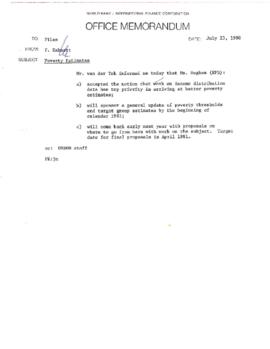


















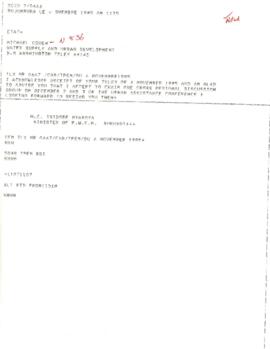


![Urban Assistance Conference - Latin America and The Caribbean [LAC]](/uploads/r/world-bank-group-archives/8/7/8/8780f2fc3802a601356b5c51ab3e969b9889390f88442dd248f345798e659de9/WorldBankGroupArchivesFolder30138254_142.jpg)




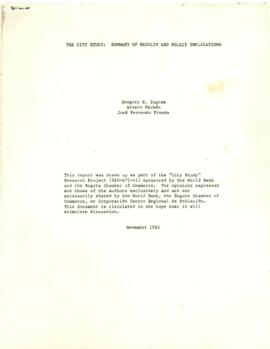
![Water Supply and Urban Development Research Material - United Nations Development Programm [UNDP]...](/uploads/r/world-bank-group-archives/9/5/9/95976d1583db0e26b76bf65de179bace79d227c344e77b3303e847ba68f526ec/WorldBankGroupArchivesFolder30253676_142.jpg)

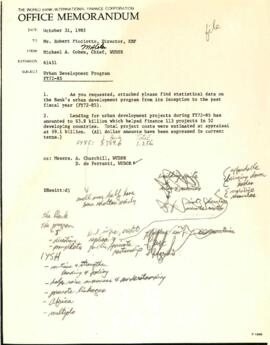


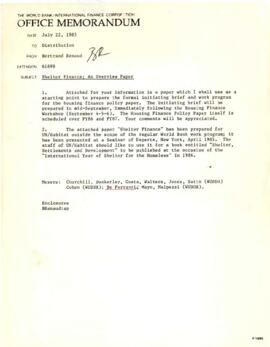


![Water Supply and Urban Development Research Material - Women in Urban Development [WUD] Annual Re...](/uploads/r/world-bank-group-archives/0/a/2/0a2fcf5185a79d5ac154b730d98768c420e17be7428ac85468532b9772737913/WorldBankGroupArchivesfolder30253664_142.jpg)


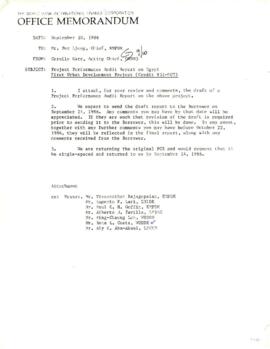




![Water Supply and Urban Development Research Material - United States [US] Agency for Internationa...](/uploads/r/world-bank-group-archives/c/7/e/c7e5ef4fec8b1d94f7bff1357f3ca2f8586d0bba7e422c8f19fecf1eab03dc7f/WorldBankGroupArchivesfolder1156167_142.jpg)



